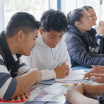UDL framework and guidelines
Learn about the foundations of UDL
On this page:
On this page:
Current page section: UDL framework and guidelines
Go to top of current page: UDL framework and guidelines
Go to top of current page: UDL framework and guidelines
Go to top of current page: UDL framework and guidelines
UDL as a framework
UDL as a framework
UDL aims to change the design of the environment rather than to situate the problem as a perceived deficit within the learner.
When environments are intentionally designed to reduce barriers, every learner can engage in challenging, meaningful learning.
CAST (2024)
UDL research evidence
UDL research evidence
UDL draws on research from intersecting fields to inform its three principles and key concepts.
Explore the research evidence in more detail.
UDL principles
UDL principles
The UDL principles help us support the three major networks in the brain that influence learning.
They help us plan for learner variability.
UDL key concepts
UDL key concepts
Honour variability, look for barriers in the design not the learner, and design for all at the outset using the UDL principles: These are the UDL key concepts.
UDL Guidelines
UDL Guidelines
The UDL Guidelines are a tool.
They offer suggestions that can be applied in any context “to ensure that all learners can access and participate in meaningful, challenging learning opportunities”.
Visit the UDL Guidelines (interactive version).
Navigate and search the UDL Guidelines
Navigate and search the UDL Guidelines
Succinct walk through of the UDL Guidelines 3.0.
Closed Captions
Next steps
More suggestions for implementing the strategy “Find out about UDL”:
-
Current page UDL framework and guidelines
Return to the guide “Universal Design for Learning”

How to use this site
Guide to Index of the guide: Universal Design for Learning
Understand:
- Why UDL is valuable
-
Find out about UDLShow suggestions for Find out about UDL
- Learner variability
- Learner agency
- UDL framework and guidelines
- UDL and differentiation
- Myths and facts about UDL
Strategies for action:
-
Design multiple means of EngagementShow suggestions for Design multiple means of Engagement
-
Design multiple means of RepresentationShow suggestions for Design multiple means of Representation
-
Design multiple means of Action and ExpressionShow suggestions for Design multiple means of Action and Expression
-
How to plan using UDLShow suggestions for How to plan using UDL
-
Design considerations in primary settingsShow suggestions for Design considerations in primary settings
-
Design considerations in secondary settingsShow suggestions for Design considerations in secondary settings
-
Design considerations in NCEA assessmentsShow suggestions for Design considerations in NCEA assessments




